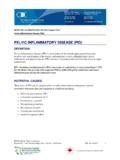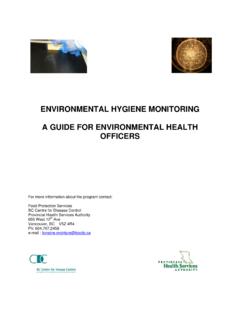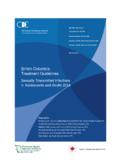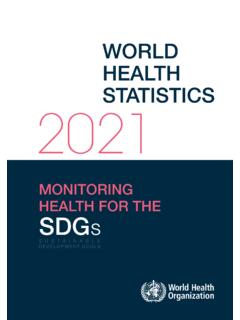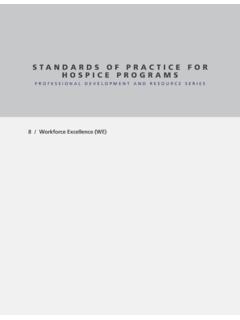Transcription of Visitors in Long-Term Care and Seniors Assisted Living
1 Ministry of Health - Overview of Visitors in Long-Term care and Seniors Assisted Living February 3, 2022 Effective January 4, 2022, and until further notice, visits to Long-Term care are restricted to essential visits and visits from single designated Visitors , as defined in this document. This guidance supports safe, meaningful visits in Long-Term care and Seniors Assisted Living settings while adhering to infection prevention & control requirements. The restrictions on visitation are grounded in Provincial Health Officer orders under section 32 (2) (b) (ii) of the Public Health Act. 2 Scope Visitation restrictions apply to Long-Term care and Seniors Assisted Living settings in , including health authority-owned and operated facilities, contracted affiliates, and fully private operators.
2 Some requirements ( , rapid point-of- care testing) in this document specifically apply to Long-Term care sites only. If not specified, requirements in this document apply to both Long-Term care and Seniors Assisted Living sites. Definitions and Foundational Information Visitation restrictions aim to protect vulnerable Seniors and Elders who are residing in Long-Term care and Seniors Assisted Living settings from COVID-19 while lessening the negative impacts associated with being apart from family and friends. Health authorities and facility operators shall continue to support Visitors for essential visits and allow social visits within established criteria, supported by a detailed plan and process as outlined below.
3 The Ministry of Health acknowledges the need to support operators to ensure safe visitation with adequate staffing. A written plan must be developed in accordance with the practice requirements outlined below. The plan must be available for licensing or the Assisted Living Registry if requested. A visitor list, with contact information and vaccination status, will be maintained as per the provincial COVID-19 infection prevention and control (IPC) guidance for Long-Term care and Seniors Assisted Living . Essential, Designated, and Social Visits Essential visits are necessarily linked with an essential need that could not be met in the absence of the essential visit. Facility staff will determine if a visit is essential.
4 An essential visit includes: Visits for compassionate reasons including critical illness, palliative care , hospice care , end of life and medical assistance in dying ; Visits paramount to the resident s physical care and mental well-being ( , assistance with feeding, mobility, personal care or communication, assistance by designated representatives for persons with disabilities); Visits for supported decision-making; Existing registered volunteers providing the services described above; Visits required to move belongings in/out of a resident s room; and Police, correctional officers, and peace officers accompanying a resident for security reasons; Essential visits shall be limited to one visitor per resident within the facility at a time, except in the case of compassionate visits related to end-of-life care .
5 Depending on the needs of a resident, more than one person may provide essential visits to ensure all needs are met. Essential visits are permitted in a care home/residence that has an active COVID-19 outbreak, under guidance and direction from the local medical health officer. Every resident in long term care is supported to identify a single designated visitor who may continue to visit the resident at times when visitation is restricted. Single designated Visitors are permitted in a care home/residence that 3 has an active COVID-19 outbreak, under guidance and direction from the local medical health officer. Single designated Visitors should be documented in the resident s record as part of the resident s care planning.
6 Long-Term care operators will support resident requests to identify an alternate single designated visitor should there be extenuating circumstances such as where the single designated visitor falls ill or moves. Social visits are visits other than essential visits or visits from a designated visitor where the primary purpose is to provide opportunities for residents to spend time with loved ones to support their social, spiritual, and emotional wellbeing. Effective January 4, 2022, and until further notice, visits in Long-Term care homes are limited to essential visits and visits from a single designated visitor per resident. Not every situation can be anticipated or addressed in detail in a guidance document.
7 Where there is uncertainty, operators and staff are encouraged to employ cultural safety and humility and take a person and family-centred approach that appropriately balances risk of transmission and the importance of visits. Virtual options for visiting will continue to be supported when appropriate. Visitor restrictions do not apply to key administrative staff entering for purposes related to facility operations. Visitor restrictions also do not apply to health professionals or any outside providers ( , medical practitioners, home support workers, allied health care providers) entering the facility to support residents. These individuals may be subject to proof of vaccination requirements as outlined in the Residential care COVID-19 Preventative Measures order.
8 Family and Visitors can request an immediate review of a visitor-related decision and shall be provided the ability to speak with a facility administrator or administrator-on-call or request further review of a decision through, or facilitated by, the health authority Patient care Quality Office (see appendix for details on the review process). Vaccination In recognition of the added layer of protection provided by the COVID-19 vaccines and given the vulnerability of residents in Long-Term care and Seniors Assisted Living even when fully vaccinated themselves, individuals 12 years or older visiting Long-Term care homes or Seniors Assisted Living residences must be fully vaccinated1 against COVID-19.
9 Proof of vaccination ( , BC Vaccine Card or equivalent) is required at the time of entry into the facility. Visitors who do not demonstrate that they are fully vaccinated will not be able to enter a facility, including passing through the facility to access an outdoor space. Exceptions include for children under the age of 12 years, those with an approved medical exemption, and compassionate visits related to end-of life. Individuals who have received a medical exemption must provide evidence of this by showing a copy of the signed medical exemption form to designated staff prior to entering the facility. 1 Full vaccination/immunization for COVID-19 is considered as seven days after receiving the full series of a World Health Organization (WHO) approved COVID-19 vaccine or a combination of approved WHO vaccines.
10 4 Rapid Point-of- care Testing As an additional layer of protection in Long-Term care , all individuals, 12 years or older, visiting Long-Term care homes must undergo rapid COVID-19 point-of- care (POC) testing , in the form of a rapid antigen test. Individuals that test positive will not be permitted to enter the site and will be instructed to self-isolate and refer to the BC Centre for Disease Control (CDC) guidance for further direction. Individuals refusing to consent to a rapid POC test will not be permitted to enter the site. In alignment with BC Centre for Disease Control guidance, it is recommended that frequent and regular Visitors not undergo rapid POC testing more than three times in one week.
